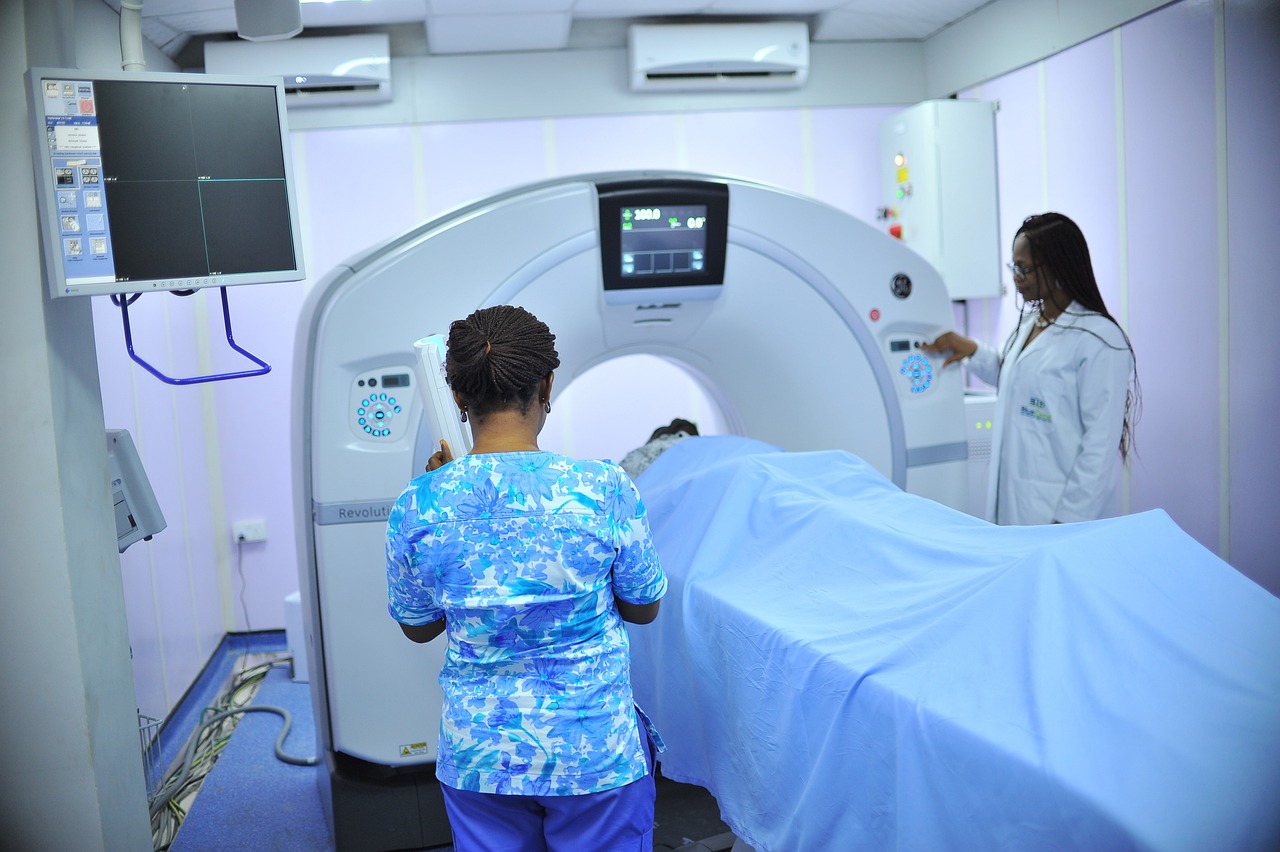Future Trends in Personalized Medicine - Tailoring Treatments
In recent years, the field of personalized medicine has gained immense traction, transforming the way we approach healthcare. Imagine a world where treatments are not just standardized but are specifically designed for you, based on your unique genetic makeup and lifestyle. This is not science fiction; it’s happening now! As we delve into the future trends of personalized medicine, we’ll explore how innovative technologies and methodologies are paving the way for customized treatments that enhance effectiveness while minimizing side effects.
At the heart of this evolution is the remarkable advancement in genomic sequencing. This technology has made it possible to decode the intricate details of our DNA, revealing insights into our genetic profiles that were once unimaginable. Healthcare providers can now tailor treatments based on specific genetic mutations and predispositions, ensuring that therapies are as effective as possible. For example, if a patient has a genetic mutation that makes them resistant to a certain medication, doctors can quickly pivot to alternative treatments that are more likely to succeed. This shift not only improves patient outcomes but also fosters a sense of empowerment among individuals, as they become active participants in their healthcare journey.
Moreover, the integration of artificial intelligence (AI) into personalized medicine cannot be overlooked. AI is revolutionizing treatment planning by analyzing vast amounts of data to predict how patients will respond to specific therapies. Imagine having a virtual assistant that can sift through thousands of treatment options and historical data to help your doctor make the best choice for you—this is the power of AI in action. Machine learning algorithms, a subset of AI, are particularly adept at identifying patterns and correlations that enhance the precision of personalized treatment plans. This means that treatments can be tailored not just to individual patients but also to specific medical conditions, leading to improved outcomes across the board.
As we explore further, it's essential to highlight the role of predictive analytics in this landscape. These tools utilize historical data to forecast treatment success, enabling clinicians to make informed choices about personalized therapies. For instance, if a patient has a history of poor response to a certain drug, predictive analytics can suggest alternative options before even starting treatment. This proactive approach is akin to having a GPS that not only charts the best route but also reroutes you in real-time to avoid traffic jams.
Additionally, real-time data monitoring has become a game-changer in personalized medicine. With the advent of wearable technology, healthcare providers can track patient responses to treatments in real-time. This allows for immediate adjustments to treatment plans based on ongoing health metrics. Picture wearing a device that continuously monitors your heart rate, blood pressure, and other vital signs, sending alerts to your doctor if something seems off. This level of monitoring means that interventions can be tailored on-the-fly, ensuring that patients receive the most effective care possible.
Speaking of wearables, they are becoming a vital component of personalized medicine. These devices not only provide continuous health monitoring but also empower patients to take charge of their health. With data at their fingertips, patients can engage in meaningful conversations with their healthcare providers, discussing potential adjustments to their treatment plans based on real-time feedback. This collaborative approach fosters a partnership between patients and providers, making healthcare a more inclusive experience.
However, as we embrace these advancements, we must also navigate the ethical considerations that arise. Issues surrounding data privacy are paramount. With the collection of sensitive genetic and health data, ensuring privacy and security remains a critical challenge. Patients must feel confident that their information is protected and used responsibly. Moreover, addressing disparities in access to personalized treatments is essential. It’s vital that all patients benefit from advancements in personalized medicine, regardless of their socioeconomic status or geographic location. After all, healthcare should be a universal right, not a privilege.
- What is personalized medicine? Personalized medicine tailors medical treatment to the individual characteristics of each patient, often based on genetic information.
- How does genomic sequencing work? Genomic sequencing involves analyzing a person's DNA to identify genetic variations that may impact health and treatment responses.
- What role does AI play in personalized medicine? AI helps analyze large datasets to predict treatment outcomes, optimizing care for individual patients.
- Are there ethical concerns with personalized medicine? Yes, concerns include data privacy, informed consent, and ensuring equitable access to treatments.

Advancements in Genomic Sequencing
Genomic sequencing has dramatically transformed the field of personalized medicine, acting as a cornerstone for tailored healthcare. Imagine having a roadmap that reveals not just where you are, but also the best routes to take for your health journey. That's exactly what genomic sequencing offers. By providing detailed insights into an individual's genetic makeup, healthcare providers can now customize treatments to fit the unique genetic profile of each patient. This means that instead of a one-size-fits-all approach, therapies can be designed based on specific genetic mutations and predispositions.
At the heart of these advancements is the ability to sequence DNA rapidly and affordably. Technologies like next-generation sequencing (NGS) have made it possible to decode entire genomes in a matter of days, rather than months or years. This speed and efficiency allow for timely interventions, which can be crucial in conditions like cancer, where every moment counts. For instance, if a patient's tumor has a specific genetic mutation, doctors can select targeted therapies that are more likely to be effective, minimizing the trial and error often associated with traditional treatments.
Moreover, genomic sequencing is not just about identifying diseases; it's also about prevention. By understanding genetic predispositions, individuals can take proactive steps to mitigate risks. For example, if a person is found to carry a gene associated with a higher risk of developing breast cancer, they might opt for increased surveillance or preventative measures. This shift towards preventive care is a game changer in the healthcare landscape.
However, the benefits of genomic sequencing extend beyond individual patients. It also has the potential to influence public health. By analyzing genetic data across populations, researchers can identify trends and risk factors associated with various diseases. This information can help in designing targeted public health initiatives and policies. For instance, if a certain genetic mutation is prevalent in a specific demographic, healthcare providers can focus on education and prevention strategies tailored to that group.
As with any groundbreaking technology, there are challenges to consider. The sheer volume of data generated by genomic sequencing raises questions about data management and interpretation. Healthcare providers must not only be equipped to analyze this information but also to communicate it effectively to patients. This brings us to the importance of genetic counseling, where trained professionals help patients understand their genetic information and its implications for their health.
In conclusion, advancements in genomic sequencing are paving the way for a future where healthcare is more personalized, proactive, and precise. By leveraging this technology, we can enhance treatment effectiveness and improve patient outcomes, making healthcare a more tailored experience. The journey towards personalized medicine is just beginning, and genomic sequencing is leading the charge.

Artificial Intelligence in Treatment Planning
Artificial intelligence (AI) is rapidly transforming the landscape of healthcare, and its integration into personalized medicine is nothing short of revolutionary. Imagine having a highly intelligent assistant that can sift through mountains of data—this is what AI brings to the table. With its ability to analyze complex datasets, AI enhances the precision of treatment plans, ensuring that each patient receives care tailored specifically to their unique needs. This is a game-changer for both patients and healthcare providers, as it allows for a more targeted approach to treatment, minimizing trial and error.
One of the most exciting aspects of AI in treatment planning is its capacity for predictive analytics. By utilizing vast amounts of historical data, AI can forecast how individual patients are likely to respond to various treatments. This means that healthcare providers can make informed decisions that are not just based on intuition but are backed by solid data. For instance, if a patient has a specific genetic marker, AI can help determine which medications are most likely to be effective, thereby increasing the chances of a successful outcome.
Moreover, the use of machine learning algorithms is pivotal in this context. These algorithms are designed to learn from data over time, constantly improving their accuracy. They can identify patterns and correlations that might be invisible to the human eye. For example, a machine learning model could analyze data from thousands of patients to discover that individuals with certain genetic traits respond better to specific treatments. This level of insight is invaluable for creating personalized treatment plans that go beyond one-size-fits-all solutions.
Another significant benefit of AI in treatment planning is the implementation of real-time data monitoring systems. These systems continuously track patient responses to treatments, allowing healthcare providers to make immediate adjustments as necessary. Imagine a scenario where a patient is undergoing chemotherapy; with real-time data, doctors can monitor side effects and efficacy, adjusting dosages or switching medications in a timely manner. This not only enhances the overall treatment experience but also leads to better health outcomes.
However, it's essential to recognize that while AI offers remarkable opportunities, it also presents challenges. The reliance on data means that any bias in the datasets can lead to skewed results. Therefore, it’s crucial for healthcare providers to ensure that the data used to train these AI systems is comprehensive and representative of diverse populations. This is vital for achieving equity in treatment outcomes.
In summary, the integration of AI in treatment planning is a significant leap forward in the realm of personalized medicine. By leveraging predictive analytics, machine learning, and real-time data monitoring, healthcare providers can craft highly individualized treatment plans that not only enhance effectiveness but also improve patient experiences. The future is bright, and as we continue to explore the capabilities of AI, we can anticipate a healthcare landscape that is more responsive and tailored to the needs of every individual.
- What is personalized medicine? Personalized medicine is an approach to healthcare that tailors treatments to the individual characteristics of each patient, often based on genetic, environmental, and lifestyle factors.
- How does AI improve treatment planning? AI enhances treatment planning by analyzing large datasets to predict treatment responses, allowing for more accurate and effective personalized care.
- What are the ethical concerns regarding AI in healthcare? Ethical concerns include data privacy, potential biases in AI algorithms, and ensuring equitable access to advanced treatments for all patients.

Machine Learning Algorithms
Machine learning algorithms are at the forefront of transforming personalized medicine. These sophisticated tools analyze vast datasets, identifying patterns and correlations that would be nearly impossible for humans to discern. Imagine having a highly skilled detective, sifting through mountains of evidence to pinpoint the most relevant clues—this is how machine learning operates in the realm of healthcare. By leveraging these algorithms, healthcare providers can develop precise treatment plans tailored to individual patients, enhancing the likelihood of successful outcomes.
One of the most exciting aspects of machine learning in personalized medicine is its ability to adapt and learn over time. As more data becomes available, these algorithms get smarter, refining their predictions based on new information. For instance, a machine learning model might analyze genetic data, patient histories, and treatment responses to suggest the most effective therapies for a specific condition. This dynamic approach not only increases the accuracy of treatment recommendations but also provides a more holistic view of the patient's health.
To illustrate the impact of machine learning algorithms, consider the following table, which outlines key areas where these technologies are making a difference:
| Area of Impact | Description |
|---|---|
| Oncology | Machine learning algorithms analyze tumor genetics to identify targeted therapies, improving treatment efficacy. |
| Cardiology | These algorithms predict cardiovascular events by examining patient data, enabling proactive interventions. |
| Pharmacogenomics | They help determine how patients metabolize medications, allowing for personalized drug prescriptions. |
Furthermore, machine learning algorithms can enhance clinical trials by identifying suitable candidates based on genetic and phenotypic data. This not only speeds up the recruitment process but also ensures that the trials are more representative of the general population. By matching patients with the right trials, we can accelerate the development of new therapies and bring them to market faster.
But it doesn't stop there! The predictive power of these algorithms extends to patient monitoring as well. For example, they can analyze data from wearable devices to detect anomalies in real-time, alerting healthcare providers to potential issues before they escalate. This proactive approach to patient care can significantly reduce hospital readmission rates and improve overall patient satisfaction.
In conclusion, machine learning algorithms are revolutionizing personalized medicine by providing data-driven insights that enhance treatment precision and patient outcomes. As these technologies continue to evolve, we can expect even more innovative applications that will further tailor healthcare to meet the unique needs of every individual.
- What is personalized medicine? Personalized medicine is a medical model that tailors healthcare to individual characteristics, needs, and preferences, often using genetic information.
- How do machine learning algorithms improve treatment plans? They analyze large datasets to uncover patterns that help clinicians make more informed decisions about patient care.
- Are there risks associated with machine learning in healthcare? Yes, potential risks include data privacy concerns and the need for rigorous validation of algorithms to ensure their reliability.

Predictive Analytics
Predictive analytics is a game-changer in the realm of personalized medicine. Imagine having the ability to foresee how a patient will respond to a specific treatment even before it begins. Sounds like something out of a sci-fi movie, right? But with the power of advanced algorithms and vast datasets, this is becoming a reality. By leveraging historical data from previous patients, healthcare professionals can make informed decisions tailored to individual needs, thereby enhancing the overall effectiveness of treatments.
At its core, predictive analytics involves analyzing patterns from past medical records, treatment responses, and outcomes. This analysis allows clinicians to identify which therapies are likely to be most effective for patients with similar profiles. For instance, if a certain medication has shown a high success rate in patients with specific genetic markers, those markers can be used to predict the success of that medication in new patients. It's like having a personalized roadmap for treatment!
Moreover, predictive analytics can significantly reduce the trial-and-error approach often associated with medical treatments. Patients no longer have to wait and see if a treatment will work; instead, they can receive therapies that have been statistically proven to yield better results. This not only saves time but also minimizes the emotional and physical toll on patients, making their journey toward recovery smoother and more efficient.
To illustrate the effectiveness of predictive analytics, let's consider a hypothetical case study:
| Patient Profile | Previous Treatments | Predicted Treatment Response | Actual Treatment Response |
|---|---|---|---|
| Patient A: 45, Female, BRCA1 Mutation | Chemotherapy, Hormonal Therapy | High Success Rate with Targeted Therapy | Successful Response |
| Patient B: 60, Male, No Genetic Markers | Chemotherapy | Standard Treatment Likely to be Ineffective | Minimal Response |
This table demonstrates how predictive analytics can guide treatment decisions. Patient A, who has a specific genetic mutation, benefited from a targeted therapy that was predicted to be successful based on her profile. In contrast, Patient B, lacking particular markers, faced a less favorable outcome with standard chemotherapy. Such insights not only enhance treatment efficacy but also empower patients by providing them with clear expectations regarding their care.
As we continue to harness the power of predictive analytics, it’s essential to recognize its potential to transform healthcare. By integrating these tools into clinical practice, we can ensure that personalized medicine is not just a buzzword but a practical reality that improves patient outcomes across the board.
- What is predictive analytics in personalized medicine?
Predictive analytics involves using historical data to forecast treatment outcomes, allowing healthcare providers to tailor therapies to individual patients effectively. - How does predictive analytics improve treatment efficacy?
By analyzing past patient data, clinicians can identify the most effective treatments for specific profiles, reducing the trial-and-error approach. - Are there any risks associated with predictive analytics?
While predictive analytics offers many benefits, concerns about data privacy and the accuracy of predictions must be addressed to ensure patient safety.

Real-Time Data Monitoring
In the ever-evolving world of personalized medicine, stands out as a game-changer. Imagine a scenario where your doctor can track your health metrics as they happen, adjusting your treatment on the fly. This is no longer a futuristic dream; it’s becoming a reality thanks to advancements in technology. By leveraging devices that continuously collect health data, healthcare providers can gain invaluable insights into how patients respond to treatments in real-time.
Consider this: traditional medical practices often rely on periodic check-ups, where patients report their symptoms and doctors make decisions based on limited information. However, with real-time monitoring, healthcare professionals can observe trends and patterns as they unfold. This means they can identify potential issues before they escalate, leading to timely interventions and better patient outcomes. For instance, a patient with diabetes can wear a continuous glucose monitor that sends data directly to their healthcare team, allowing for immediate adjustments in insulin dosing based on current blood sugar levels.
Furthermore, the integration of wearable technology—like smartwatches and fitness trackers—into the healthcare ecosystem has made it easier than ever to gather this data. These devices can track a variety of metrics, including heart rate, activity levels, and even sleep patterns. When this information is combined with advanced analytics, it creates a comprehensive picture of a patient’s health, allowing for truly personalized treatment plans. Healthcare providers can utilize this data to tailor interventions that are not only effective but also minimize side effects.
However, it’s important to recognize that while real-time data monitoring offers significant benefits, it also raises questions about data privacy and security. Patients must feel confident that their sensitive health information is protected. As we move forward, it will be crucial for healthcare providers to implement robust security measures to safeguard this data while ensuring that patients are fully informed and consenting to the use of their information.
In conclusion, real-time data monitoring is paving the way for a new era in personalized medicine. By enabling healthcare providers to make informed decisions based on live data, we are not only enhancing the effectiveness of treatments but also fostering a more proactive approach to healthcare. The future is bright, and as technology continues to advance, the possibilities for personalized medicine are endless.
- What is real-time data monitoring?
Real-time data monitoring refers to the continuous collection and analysis of health metrics, allowing healthcare providers to make immediate adjustments to treatments based on live data. - How does wearable technology contribute to personalized medicine?
Wearable technology collects various health data, which can be analyzed to create tailored treatment plans that respond to an individual’s unique health needs. - What are the privacy concerns associated with real-time data monitoring?
The collection of sensitive health data raises concerns about data privacy and security, making it essential for healthcare providers to implement strong protective measures. - Can real-time monitoring improve patient outcomes?
Yes, by allowing for timely interventions and personalized adjustments to treatment, real-time monitoring can significantly enhance patient outcomes.

Integration of Wearable Technology
This article explores the evolving landscape of personalized medicine, focusing on innovative approaches and technologies that enable customized treatments for patients, enhancing effectiveness and minimizing side effects.
Genomic sequencing has revolutionized personalized medicine by providing detailed insights into individual genetic profiles, allowing healthcare providers to tailor treatments based on specific genetic mutations and predispositions.
Artificial intelligence (AI) is increasingly being integrated into personalized medicine, enabling more accurate predictions of treatment responses and optimizing patient care through data-driven decision-making.
Machine learning algorithms analyze vast datasets to identify patterns and correlations, enhancing the precision of personalized treatment plans and improving patient outcomes across various medical conditions.
Predictive analytics tools utilize historical data to forecast treatment success, helping clinicians make informed choices about personalized therapies and interventions for individual patients.
Real-time data monitoring systems track patient responses to treatments, allowing for immediate adjustments and personalized care strategies based on ongoing health metrics.
Wearable technology is becoming a vital component of personalized medicine, providing continuous health monitoring and enabling healthcare providers to tailor interventions based on real-time data. Imagine wearing a device that not only tracks your heart rate but also analyzes your sleep patterns and physical activity levels to give your doctor a holistic view of your health. This capability is not just futuristic; it's happening right now!
With devices like smartwatches and fitness trackers, patients can effortlessly collect data about their health metrics. This data is invaluable for healthcare providers as it allows them to adjust treatment plans dynamically. For instance, if a patient’s wearable device indicates elevated stress levels or irregular heart rhythms, a healthcare professional can intervene promptly, potentially preventing serious health issues.
Moreover, the integration of wearable technology facilitates a more proactive approach to healthcare. Patients can be educated about their health conditions and encouraged to participate in their treatment plans actively. This empowerment leads to better adherence to prescribed therapies and lifestyle modifications, ultimately improving health outcomes.
As we delve deeper into this technological integration, it’s essential to recognize the types of data these wearables can provide:
- Heart Rate Monitoring: Continuous tracking of heart rate can help in managing cardiovascular conditions.
- Activity Levels: Monitoring daily activities can guide physical rehabilitation and fitness plans.
- Sleep Quality: Insights into sleep patterns can assist in managing sleep disorders.
- Blood Oxygen Levels: Critical for patients with respiratory issues, providing alerts for low oxygen saturation.
This wealth of information enables healthcare professionals to create a more tailored approach to treatment. However, the effectiveness of wearable technology in personalized medicine hinges on the collaboration between patients and providers. Patients must be willing to share their data and engage with their healthcare teams to maximize the benefits of these technologies.
As personalized medicine advances, ethical considerations arise, including data privacy, informed consent, and equitable access to tailored treatments for diverse patient populations.
With the collection of sensitive genetic and health data, ensuring privacy and security remains a critical challenge in the implementation of personalized medicine practices.
Addressing disparities in access to personalized treatments is essential for ensuring that all patients benefit from advancements in personalized medicine, regardless of socioeconomic status or geographic location.
Q: What is personalized medicine?
A: Personalized medicine is a medical model that tailors healthcare, with decisions and treatments customized to the individual patient based on their predicted response or risk of disease.
Q: How does wearable technology contribute to personalized medicine?
A: Wearable technology collects real-time health data, allowing healthcare providers to monitor patients continuously and adjust treatment plans based on actual health metrics.
Q: Are there any risks associated with using wearable technology?
A: Yes, concerns include data privacy, accuracy of the data collected, and the potential for patients to misinterpret their health information without proper guidance from healthcare professionals.
Q: Can personalized medicine benefit everyone?
A: While personalized medicine holds great promise, equitable access to these advancements is crucial to ensure all populations benefit, regardless of socioeconomic status.

Ethical Considerations in Personalized Medicine
As we dive deeper into the realm of personalized medicine, it becomes increasingly clear that while the benefits are immense, there are also significant ethical considerations that must be addressed. The very nature of this innovative approach to healthcare raises questions about data privacy, informed consent, and the equitable access to treatments tailored for individual patients. These concerns are not just abstract notions; they have real implications for how we approach healthcare in the modern world.
One of the foremost issues is data privacy. With the advent of genomic sequencing and the collection of sensitive health information, patients are understandably concerned about who has access to their data and how it is being used. Imagine sharing your deepest secrets with a friend, only to find out they’ve shared them with others without your consent. This analogy highlights the importance of trust in the patient-provider relationship. Healthcare providers must implement robust security measures to protect sensitive information and ensure that patients feel safe in sharing their genetic data.
Informed consent is another critical aspect of ethical personalized medicine. Patients should not only be aware of the treatments they are receiving but also understand the implications of their genetic information being used in treatment planning. This means that healthcare professionals must engage in transparent conversations with patients about what personalized medicine entails. Are patients fully aware of how their genetic data will be utilized? Do they understand the potential risks and benefits? These questions are essential to fostering an environment where patients can make informed decisions about their health.
Moreover, we cannot overlook the issue of equity in healthcare access. As personalized medicine becomes more prevalent, there's a risk that only certain populations will benefit from these advancements. For instance, individuals from lower socioeconomic backgrounds or those living in remote areas may face barriers to accessing cutting-edge treatments. This disparity can lead to a widening gap in health outcomes. It’s crucial that we work towards ensuring that all patients, regardless of their background, have access to the benefits of personalized medicine. This might involve policy changes, increased funding for healthcare in underserved areas, or initiatives aimed at educating diverse populations about these new treatments.
To summarize, the ethical considerations surrounding personalized medicine are vast and complex. Addressing issues of data privacy, informed consent, and equitable access is essential to realizing the full potential of this innovative approach to healthcare. As we forge ahead into a future where treatments are tailored to individual needs, we must ensure that ethical principles guide our path. Only then can we truly say that personalized medicine is a boon for all.
- What is personalized medicine? Personalized medicine is a medical model that tailors treatments to individual characteristics, such as genetic makeup, lifestyle, and environmental factors.
- Why is data privacy important in personalized medicine? Data privacy is crucial because sensitive genetic information can be misused if not properly protected, leading to potential discrimination or breaches of trust.
- How can we ensure equitable access to personalized medicine? We can ensure equitable access by implementing policies that provide funding for underserved populations and increasing awareness about personalized treatments.

Data Privacy Concerns
As personalized medicine continues to evolve, one of the most pressing issues that emerges is data privacy. With healthcare systems increasingly reliant on genetic and health data to tailor treatments, the sensitivity of this information raises significant concerns. Imagine a world where your genetic makeup, lifestyle choices, and health records are all interconnected and accessible to various stakeholders. While this can lead to more effective treatments, it also opens the door to potential misuse of personal information.
Patients are often unaware of how their data is being used, who has access to it, and for what purposes. This lack of transparency can lead to a sense of vulnerability among individuals. To illustrate, consider the following:
| Data Type | Potential Risks |
|---|---|
| Genetic Data | Discrimination by employers or insurance companies |
| Health Records | Unauthorized access leading to identity theft |
| Wearable Device Data | Invasion of privacy if data is shared without consent |
Moreover, the question arises: how can we ensure that patients' rights are protected while still benefiting from the advancements in personalized medicine? The answer lies in stringent regulations and ethical guidelines that govern the collection, storage, and sharing of health data. For instance, frameworks like the Health Insurance Portability and Accountability Act (HIPAA) in the United States set standards for protecting sensitive patient information. However, as technology advances, these regulations must also adapt to address new challenges.
Another critical aspect is the role of informed consent. Patients should have a clear understanding of what they are agreeing to when they share their data. This means healthcare providers must communicate effectively about how data will be used, stored, and protected. Informed consent should not be a mere checkbox; it should be an ongoing dialogue between patients and healthcare providers.
In summary, while personalized medicine holds incredible promise for enhancing patient care, it is imperative to address the that accompany it. Without robust protections in place, we risk undermining the very trust that is essential for effective healthcare delivery. As we move forward, a balanced approach that prioritizes patient privacy while embracing innovation will be crucial in shaping the future of personalized medicine.
- What is personalized medicine? Personalized medicine is a medical model that tailors treatments to individual characteristics, preferences, and genetic profiles.
- How does data privacy impact personalized medicine? Data privacy concerns arise from the sensitivity of genetic and health data, leading to potential misuse and unauthorized access.
- What measures are in place to protect patient data? Regulations like HIPAA help protect patient data, but ongoing efforts are needed to adapt to new technological challenges.
- Why is informed consent important in personalized medicine? Informed consent ensures that patients understand how their data will be used and empowers them to make informed decisions about their health.

Equity in Healthcare Access
As we delve into the world of personalized medicine, one of the most pressing issues that emerges is the . This is not just a buzzword; it's a fundamental principle that ensures every patient, regardless of their background, has the opportunity to benefit from tailored treatments. Imagine a world where the latest advancements in medicine are available to everyone, not just a privileged few. Unfortunately, this is not the reality we live in today.
The disparities in healthcare access can be attributed to several factors, including socioeconomic status, geographic location, and even education level. For instance, individuals living in rural areas may struggle to find specialists who can provide personalized treatments, while those in urban centers may have more options but still face financial barriers. The question arises: how can we bridge this gap?
One approach is to enhance telemedicine services, which can connect patients in remote areas with healthcare providers who specialize in personalized medicine. This technology can serve as a lifeline, allowing patients to receive consultations and follow-up care without the need for extensive travel. Moreover, community outreach programs can play a crucial role in educating underrepresented populations about their healthcare options, ensuring that they are informed and empowered to seek the treatments they need.
Furthermore, it's essential to consider the cost of personalized medicine. While these treatments often promise better outcomes, they can also come with a hefty price tag. Here, policy changes and insurance reforms are necessary to ensure that cost does not become a barrier to accessing innovative therapies. For example, implementing sliding scale fees based on income or expanding coverage for genetic testing can make a significant difference.
To truly achieve equity in healthcare access, collaboration among stakeholders is key. Healthcare providers, policymakers, and community organizations must work together to create systems that prioritize accessibility. This includes investing in infrastructure that supports equitable access, such as transportation services for patients who need to travel for care.
In summary, addressing equity in healthcare access is not just an ethical obligation; it's a necessity for the future of personalized medicine. By leveraging technology, reforming policies, and fostering community engagement, we can move towards a healthcare system where tailored treatments are available to everyone, ensuring no one is left behind in this new era of medicine.
- What is personalized medicine? Personalized medicine refers to medical practices that are tailored to the individual characteristics of each patient, often based on genetic information.
- Why is equity in healthcare access important? Ensuring that all patients have access to personalized treatments is crucial for achieving better health outcomes and reducing disparities in healthcare.
- How can technology improve healthcare access? Technologies like telemedicine can connect patients to specialists regardless of their location, making healthcare more accessible.
- What role do policies play in healthcare access? Policies can help reduce financial barriers to care, ensuring that innovative treatments are affordable and accessible to all patients.
Frequently Asked Questions
- What is personalized medicine?
Personalized medicine is a medical model that tailors treatments to individual characteristics, needs, and preferences of patients. It leverages genetic, environmental, and lifestyle factors to provide more effective healthcare solutions.
- How does genomic sequencing contribute to personalized medicine?
Genomic sequencing provides detailed insights into a person's genetic makeup, allowing healthcare providers to identify specific genetic mutations and predispositions. This information helps in customizing treatments that are more likely to be effective for the individual.
- What role does artificial intelligence play in personalized medicine?
Artificial intelligence enhances personalized medicine by analyzing vast amounts of data to predict treatment responses. It helps healthcare professionals make data-driven decisions, improving patient care and treatment outcomes.
- What are machine learning algorithms?
Machine learning algorithms are advanced computational models that analyze data to identify patterns and correlations. In personalized medicine, they enhance the precision of treatment plans by predicting how patients will respond to specific therapies.
- Can wearable technology improve personalized medicine?
Absolutely! Wearable technology provides continuous health monitoring, allowing healthcare providers to access real-time data. This enables them to tailor interventions based on ongoing health metrics, leading to more personalized care.
- What ethical concerns are associated with personalized medicine?
As personalized medicine evolves, ethical issues arise, including data privacy, informed consent, and the need for equitable access to treatments. Addressing these concerns is crucial to ensure that advancements benefit all patients fairly.
- How is data privacy maintained in personalized medicine?
Maintaining data privacy involves implementing strict security measures to protect sensitive genetic and health information. Healthcare providers must adhere to regulations and best practices to ensure patient confidentiality and trust.
- What can be done to ensure equity in healthcare access?
To ensure equity in healthcare access, it's essential to address disparities related to socioeconomic status and geographic location. Initiatives that promote access to personalized treatments for diverse populations are vital in achieving this goal.



















